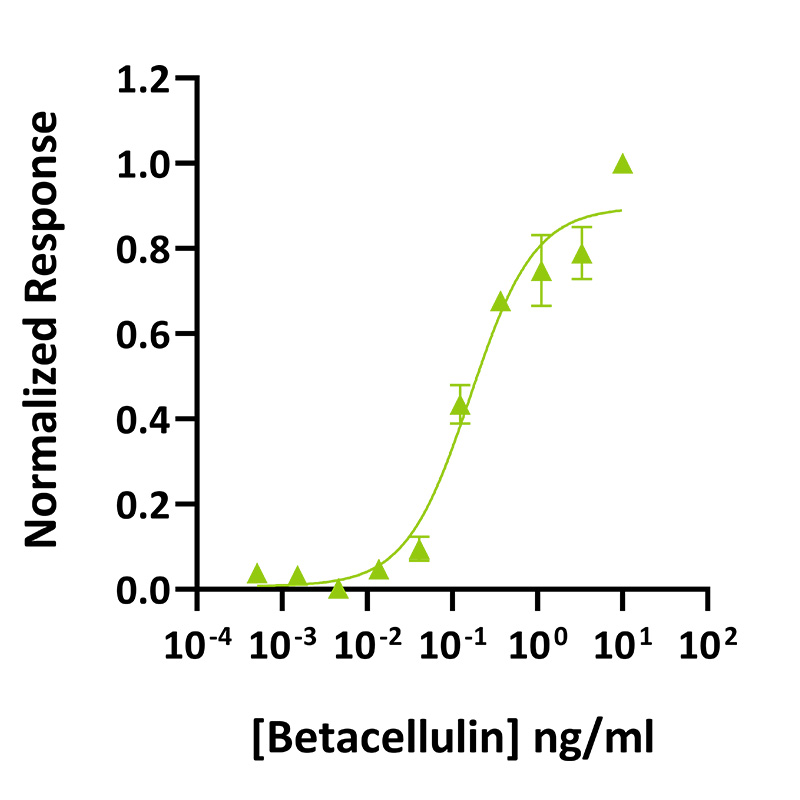Pep talk - July 2025

Qkine and 3D Bio-Tissues collaborate to improve cell-care for pluripotent stem cell and cellular agriculture applications
Qkine and 3D Bio-Tissues have partnered to complete testing and validation of 3D Bio-Tissues' novel macromolecular crowding technology. CytoBoost™ uses biocompatible macromolecules that reproduce the very crowded conditions within in vivo biosystems, thus creating culture environments more amenable to cells. By using Qkine high purity and bioactivity growth factors in combination with CytoBoost™ the aim is to increase growth factor efficiency, improve culture performance and bioprocessing yields and reduce costs for scaling industries such as cellular agriculture.
We're happy to share the data from these collaborative studies in two new application notes
- CytoBoost™ for increased proliferation of muscle and fat cells in serum-free cultures
- CytoBoost™-enhanced growth factor activity for cell culture and bioprocessing
Read more about 3D BioTissues and the collaboration with Qkine

3DBT proprietary CytoBoost™ range is a suite of unique, xeno-free cell culture formulations that enhance cell growth, tissue development, and biologics production across a wide variety of applications. CytoBoost™ offers unmatched versatility in 2D and 3D cultures, reducing reliance on growth factors and serum, and delivering consistent, high-yield results for biotech and pharma.

UK Stem Cell Network meeting - 16-17 September 2025
Exciting update on the UKSCN inaugural meeting 16th-17th September 2025 in Manchester, UK.
Co-sponsors Qkine and Stem Cell Technologies will be hosting an evening of networking at the beautiful Manchester Museum in the Fossils and Living Worlds exhibition on the 16th September with drinks, snacks and entertainment!
Don't miss out, Register now to secure your place.
The original UK National Stem Cell Network provided a focal point for the community and particularly supported early career stem cell researchers (ECRs) by providing opportunities to network and engage with stakeholders and leaders in the field at events close to home.
UK Stem Cell Network 25 aims to canvass the community and seek a mandate to reform this vital network, reconnecting a community to help retain the UK competitiveness in our field for the benefit of the UK society and economy.
Visit the conference website for more information
Did you miss?
Blog: Protein tags, why and why not?
To improve the reproducibility and reliability of experiments relying on recombinant proteins, including biochemical assays and cell culture media, it is important to use tag-free proteins unless the application specifically requires a tagged form of the protein. But sometimes tags are useful or even necessary - so we ask Protein tags, why and why not?
Blog: Unexpected consequences: growth factor cross-contamination in mammalian and E. coli expressed growth factors
New Products Launched
Recombinant human betacellulin protein (Qk123)
Betacellulin is a member of the epidermal growth factor (EGF) family which regulates proliferation and differentiation in various stem cell types. Betacellulin stimulates proliferation and maintains pluripotency in neural and osteogenic stem cells. It can induce pancreatic β-cell differentiation in human embryonic stem cells (ESC) and differentiation of retinal progenitor cells.
Qkine human betacellulin is a highly pure and bioactive 9.89 kDa protein, animal origin-free (AOF), carrier-free, tag-free, and non-glycosylated to ensure its purity with exceptional lot-to-lot consistency.

Recombinant human IL-18 protein (Qk100)
Interleukin-18 (IL-18) is a proinflammatory cytokine that plays a role in both the innate immune and acquired immune responses. IL-18 stimulates T cells, NK cells and dendritic cells and can act in combination with other interleukins to stimulate interferon (IFN)γ. IL-18 can reduce proliferation and maintain pluripotency in hematopoietic stem cells. IL-18 may have potential therapeutic applications in enhancing antitumor immunity by promoting the differentiation of effector T cells.
Qkine recombinant human IL-18 is 18 kDa highly pure and bioactive protein suitable for immune cell culture and activation.

Hepatocyte-like cell differentiation using Qkine animal origin-free growth factors
Since their introduction in 2006, induced pluripotent stem cells (iPSCs) have revolutionized research and therapeutic development. iPSCs are invaluable for disease modeling due to their unique ability to differentiate into nearly any cell type, making them a powerful tool for studying genetic disorders, infections, and cancers. One key application of iPSCs is hepatocellular differentiation, a critical area within regenerative medicine. Hepatocyte-like cells (HLCs) derived from iPSCs exhibit many functions of primary liver cells. This advancement holds promise for liver disease research and the development of personalized treatment pathways. These advancements may ease the demand for liver transplants by providing an alternative cell source for therapeutic use.
Producing functional hepatocytes from iPSCs requires precise activation of key signaling pathways, such as Wnt, activin/nodal, FGF, and BMP, to replicate the stages of liver development. The sequential activation of these pathways supports early liver cell differentiation, while maturation is driven by factors such as hepatocyte growth factor (HGF) and oncostatin M (OSM).

Our application note: Hepatocyte-like cell differentiation using Qkine animal origin-free growth factors contains the full protocol for hepatocellular-like differentiation from iPSC.
This month we have also launched our new Hepatocellular-like differentiation kit (Qk518) saving 50% on purchasing the individual growth factors required for this protocol.
Hepatocellular-like differentiation kit (Qk518)
The hepatocellular-like differentiation kit is a comprehensive tool designed to assess and confirm the differentiation potential of both newly derived and established iPSC lines. Containing all Qkine animal origin-free growth factors for hepatocyte-like cell differentiation.

Recombinant human HGF NK1 protein (Qk013)
Qkine recombinant human HGF NK1 protein is a potent naturally occurring isoform of HGF. This protein is animal origin-free, carrier protein-free, and tag-free to ensure its purity with exceptional lot-to-lot consistency with a molecular weight of 20 kDa. It promotes efficient differentiation of human induced pluripotent stem cells to hepatocyte-like cells at just 10 ng/ml with highly homogeneous expression of the hepatic marker, HNF4α.

Qkine animal origin-free human HGF NK1 (QK013) has higher bioactivity than a HEK293 expressed alternative supplier protein (Supplier B).
New Publications
HCR-Proxy resolves site-specific proximal RNA proteomes at subcompartmental nanoscale resolution
Trupej A et al, BioRxiv May 2025
Researchers introduce a proximity labelling technique that enables proteomic profiling of RNA-proximal proteomes at subcompartmental resolution. The spatial organization of RNA condensates is fundamental for understanding of basic cellular functions, but may also provide pivotal insights into diseases.
Used Qkine LIF (Qk018)
Organoid morphology-guided classification for oral cancer reveals prognosis
Researchers developed an extensive patient-derived organoid repository for oral cancer research and determined an organoid morphology-driven refined classification for the prognosis of oral cancer based on subtype with genomic and transcriptomic profiling.
Used Qkine R spondin 1 (Qk006)
All our growth factors are manufactured within a stringent quality framework, ensuring high-quality proteins that maintain robust, reproducible, and physiologically relevant stem cell and organoid cultures that adhere to our Nine-point Quality Commitment.
Upcoming Events
- 4th Interdisciplinary Signaling Workshop | 28-31 July 2025 | Visegrad, Hungary
- 17th Annual Symposium: Mechanisms and Models of Cancer | 29 July-1 August 2025 | La Jolla, California, US
- The Cell Summit '25 - Innovations in Processing & Scale Up | 5-6 August 2025 | Indianapolis, Indiana, US
We'd always love to meet you at any of events, contact support@qkine.com to make an appointment.
What’s next?
Qkine are committed to producing the most high quality and bioactive growth factors and cytokines, coming soon to our extensive portfolio:
- Recombinant human EPO protein (Qk099) - Expected July 2025
- Recombinant human TPO protein (Qk098) - Expected July 2025
If you wish to be notified when proteins are released, contact us customerservice@qkine.com


